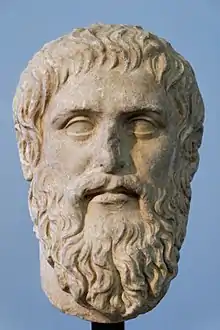Axiochus (dialogue)
Axiochus (Greek: Ἀξίοχος) is a Socratic dialogue attributed to Plato, but which has been considered spurious for over 400 years. The work dates from the Hellenistic era, c. 1st century BC. The author was probably a Platonist,[1] or perhaps a Neopythagorean.[2] It forms part of the consolation literature which was popular in Hellenistic and Roman era, although it is unusual in being addressed to someone who is close to death, rather than someone who has lost a loved-one.[1]
| Part of a series on |
| Platonism |
|---|
 |
| The works of Plato |
|
| Related articles |
| Related categories |
|
Plato |
In the dialogue, Axiochus has come close to death, and is scared by the experience, despite his familiarity with the arguments which were supposed to make him scorn the fear of death. Socrates is summoned to his bedside, and consoles him with a wide variety of teachings to help Axiochus welcome death as the release of the soul to a better place.[1]
References
- John Madison Cooper, D. S. Hutchinson, (1997), Plato, Complete works, page 1734. Hackett Publishing.
- William Keith Chambers Guthrie (1986), A history of Greek philosophy, page 395. Cambridge University Press
External links
 Works related to Axiochus at Wikisource
Works related to Axiochus at Wikisource- Latin translation by Marsilio Ficino
- Free public domain audiobook version of Axiochus translated by George Burges
 Apocrypha public domain audiobook at LibriVox. Collection includes Axiochus. George Burges, translator (1855).
Apocrypha public domain audiobook at LibriVox. Collection includes Axiochus. George Burges, translator (1855).

